#steep footpath
Explore tagged Tumblr posts
Text

Footpath between the middle and upper promenades at Bispham, Blackpool, with flowers.
2 notes
·
View notes
Text


Congratulations to Tara Dower for becoming the fastest person in history to complete the Appalachian Trail! The 31-year-old from Virginia completed the 2,168 mile (3,489 km) backcountry trail in 40 days, 18 hours, and five minutes, a distance usually covered by an A.T. thru-hiker in five to seven months.
To set the record, Dower ran and hiked an average of 54 miles each day on the often rocky and steep trail, which includes a total vertical gain of 465,000 feet as it runs through fourteen states. She started her daily runs at 3:30 am and continued for approximately 17 hours with several short breaks for meals and 90-second "dirt naps."
Dower used her record-setting run to raise money for Girls on the Run, saying that she hopes her feat will inspire girls and women. “I hope more women get out there,” she said. “It’s about finding our true potential. And, you know, if you beat the men, that’s an extra bonus.” When she reached the trail's end on Saturday night, the exhausted but jubilant Dower fell to her knees and put her hands on the bronze plaque that reads, “A footpath for those who seek fellowship with the wilderness.”
9/28/2024
Article | Tara Treks | Girls on the Run
1K notes
·
View notes
Text

Take a Break
Summary: You go on a hike with Marcus Pike despite having chronic fatigue Warnings: Reader has a disability called chronic fatigue (she’s just like me fr), Marcus being perfect and sweet, reader being hard on herself and trying to push through and generally just needing a hug. A/N: I know this one is niche – more of a self insert than a reader insert – but i think it’s sweet. Hope y’all like it <3
Marcus Pike Masterlist | Masterlist | Prompt Fills | AO3 | Kofi | Seasons of Life Masterlist
The footpath in front of you is rocky and steep, daunting. Marcus is halfway up the hill before he stops and turns around.
“Do you need to take a break?” He asks with a concerned look on his handsome face.
“No! No, I’m fine,” you say, lying. You are not fine. You’re exhausted already and you’ve only been hiking for 30 minutes. Hiking is not an activity you would have agreed to do with anyone before Marcus. Your relationship is new, but you’re already starting to care deeply about him. He wanted to go hiking, so you agreed.
Marcus waits for you as you trudge up the hill, eyes focused on your feet so you don’t trip. You’re not even getting to enjoy the beautiful green foliage around you because you’re too worried about your legs not working properly. When you make it to Marcus, he gently places his hands on your shoulders. You meet his eyes and see worry there.
“We’re gonna take a break now, okay?”
“I don’t want you to have to stop for me,” you hate this. You hate looking weak.
“I want to stop, it’s okay. I promise.” He guides you to the edge of the trail and plops down on the ground, patting the spot beside him indicating he wants you to join him. You slowly sit down and he hands you a water and a granola bar from his pack.
You take both gratefully and feel tears well up in your lash line. You blink them away, but not before Marcus notices.
“Hey! Hey, don’t cry baby. I’m not upset with you, I promise,” he reaches over and brushes his thumb across your cheek, wiping away a stray tear.
“I’m upset with myself,” you huff. “I thought I could do this and I can’t.”
“You can do this. We will take as many breaks as we need to. I’m gonna kiss you at the top of this hike no matter how long it takes to get there. We have plenty of time.” He wraps an arm around your shoulder and pulls you into him. You lay your head on his shoulder and feel yourself calming down.
“Thank you, Marcus… Sorry for being a crybaby.”
“Hush. You’re perfect.”
@fanfictionoverload
#fanfictionoverload#seasonsoflifechallenge#Marcus Pike#Marcus Pike fics#Marcus Pike x reader#Marcus Pike x you#The Mentalist fanfiction#pedro pascal#pedro pascal character fanfiction#ppcu fanfiction#pedro pascal fanfiction
126 notes
·
View notes
Text

Takachiho Gorge Footpath, Takachiho, Japan: Takachiho Gorge in the lush Miyazaki Prefecture of Kyushu is Designated as National Place of Scenic Beauty. Nestled in a steep gorge forged from an eruption of Mt. Aso volcano, Manai Falls (the actual name for the waterfall) are the most captivating cascades in Japan, with the walk through the gorge no less than breathtaking... Takachiho (Takachiho-chō) is a town in Nishiusuki District, Miyazaki Prefecture, Japan. Wikipedia
123 notes
·
View notes
Text
ANNIVERSARY IN SUSSEX
John and Sherlock are happily married, have become old and are now retired. Currently, they prepare for an important anniversary and there will be slices of their life in Sussex and memories of what happened in the decades since they got together.

Chapter 8 is up on AO3, prompt road
“Let’s take the field track to Lower Tarrandale,” John proposed when they arrived at a junction on their way back to the cottage. “I’d like to grab a pint and some pub food at the Hound and Hare and then we’ll return via the footpath along the road.”
“Of course, if you like. I could use a glass of cider. This return path will also be less steep and easier for you to manage with your knee.”
“You could also use a good wash of your face. Not so sure about how much of the chalk dust you can get out of your hair, though.”
@fluffbruary
15 notes
·
View notes
Text
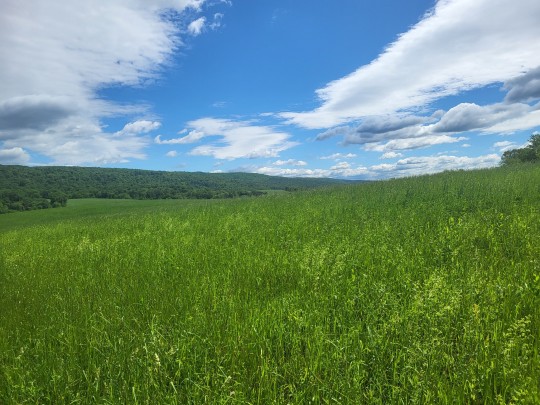
Took a trip to Windows 95 last Sunday.
...okay, so this is actually part of the Appalachian Trail, a section between Marysville and Duncannon, Pennsylvania. I was dropped off at the southern lot and made my way north.

The fields very soon gave way to a more familiar forested pathway, albeit somewhat damp from recent rains. It was just about 70° and breezy, some of the best weather I've been out with, and I ran into quite a few hikers and trailrunners.

The forest was in full bloom of life - the air was full of insect and bird calls, flowers dotted the foliage, and it was entirely greener than reasonable. I was careful not to disturb too much as I went.
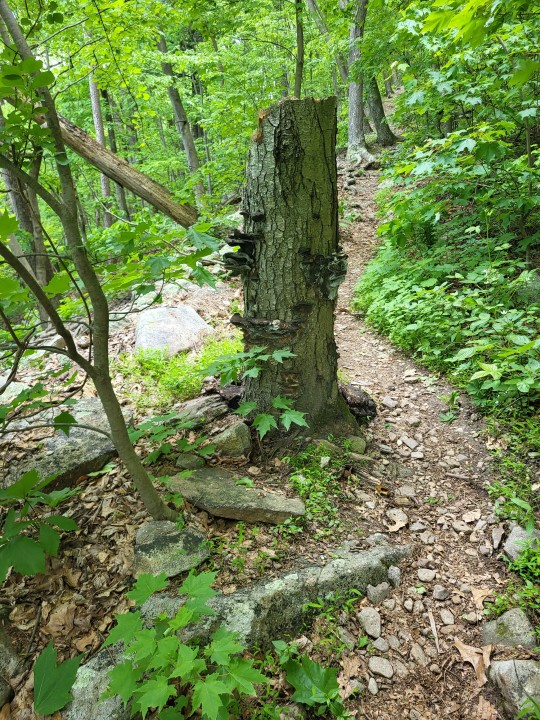
A little less than a mile into the hike came a steep slope angled up the side of Cove Mountain. If the verdant fields at the start were Windows 95, this was Windows ME - a long, tiring slog of misery. But I knew from my route planning that the rest of my route would be largely flat or downhill afterwards.

Once I'd made it to flat ground, I sat on a rock for a bit as I recovered. I was close to my first planned break spot anyway, though, so I got back to walking and soon enough found a vista.
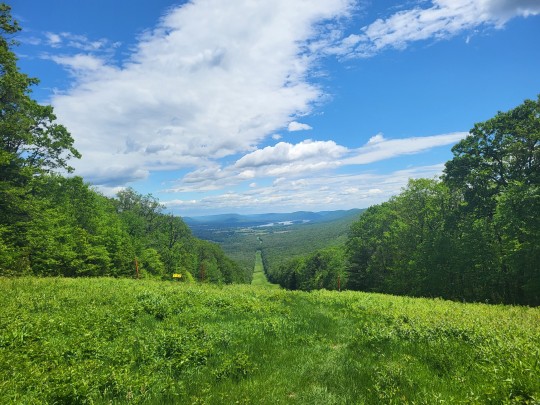
A gas line cutaway stretched down the mountain into the distance. I had to resist the urge to lie on my side and roll all the way down the hill.

The meadow on top was fairly large, so I wandered around for a bit, then sat on a large flat rock to eat my mid-hike protein bar. I saw a couple hikers pass me so I gave them a chance to get well ahead before setting back off. I also cleared some litter up, which I was pretty proud of.

It was pretty much smooth sailing for quite a while after the clearing. I met a hiker coming the other way who asked if I'd seen anywhere good to stop and eat lunch on the trail, and I told her quite effusively about the meadow.

#treeswithbutts

This mysterious blue-blazed trail beckoned to me, but given that it didn't show up on Maps or on Footpath and didn't follow a ridge, I didn't go for it.
7 notes
·
View notes
Text
Chapter Fifteen: The Bloom Beneath

She walked until the cabin disappeared behind her, until the last tendrils of smoke from Hecate’s herbs faded from the air, and the hush of the morning wrapped around her like a second skin.
The forest gave way to a narrow footpath, barely there, winding downward through the trees. The slope was steep, but Persephone moved with purpose, guided by something she couldn’t quite name—an instinct buried so deep inside her it felt like memory.
She was drawn to the valley.
Down where the canopy thinned and the earth leveled, she found it—a quiet glen, cradled between two hills, where a river curled like a silver ribbon through a bed of moss-covered stone. The sun was resting just above the horizon, casting a warm glow that shimmered across the water’s surface. Crickets sang in the underbrush, and fireflies blinked slowly in the reeds like thoughts trying to take form.
Mist hovered above the water, delicate and veiled, like a breath not yet exhaled. The air smelled of new beginnings—of dew and root and stories waiting to be told. Each step Persephone had taken led here, to this hidden place beneath the world’s noise.
Persephone sank to her knees at the riverbank, her boots pressing into the damp soil. She inhaled deeply—the scent of wet earth, river rock, and something faintly floral in the breeze.
She unwrapped the potion from the fold of her cloak and held it in her lap.
It was small. Unassuming. Just a vial of liquid glowing faintly lavender in the light. But it might as well have been the world.
Hecate had said it wouldn’t grant her freedom. Just help her remember what it felt like.
She turned the vial in her fingers, watching the liquid swirl like ink in water. She thought about the last few days. The dreams. The visions. The throne in the dark. The voices calling to her like echoes of a life not yet lived. And now, something inside her was shifting again, breaking loose from its bindings.
For a moment, doubt whispered at the edge of her mind—what if she was wrong?
What if this was just an illusion, another trick of divine design meant to divert her from the path laid out for her by Olympus? The gods dealt in control. This was something else. Older. Wiser. Woven not by force, but by choice.
A breeze stirred the surface of the river, and with it came a sound—not quite words, but not silence either. A pulse. A breath. As if the land itself were waiting for her to make a choice. Birds had quieted. The air hung heavier now, not with warning but with readiness.
She unstoppered the vial.
The scent hit her like memory—damp violets, scorched cedar, and the mineral tang of stone left in the sun. It made her eyes sting, but not from pain. From recognition.
The wind picked up. The river responded with a sudden shiver across its surface.
Persephone looked around the valley. It was empty, still, and somehow sacred. The kind of place the gods had long forgotten, where the old magic still curled like roots beneath the surface.
She raised the vial.
“To the part of me that still listens,” she whispered. “To the one that still remembers who I am—before the names, before the titles, before the crown.”
And she drank.
The potion slid down her throat like liquid fire and frost combined—icy at first, then burning in the core of her chest. She gasped, one hand gripping the earth beside her, the other clutching her stomach.
The sensation was immediate and all-consuming.
It wasn't pain. It was activation.
Her veins lit up like silver threads, and the world around her dissolved—not into darkness, but into something deeper. Earth and memory. Moonlight and breath. A silence that wasn’t empty, but listening.
She fell forward, hands in the dirt, forehead pressed to the mossy bank. The hum of the potion grew louder in her ears, then steadied into a rhythm—a heartbeat not her own, not exactly. The Earth’s heartbeat. The pulse of something old. Older than the gods. Older than her father’s power. Older even than fate.
It was welcoming her.
The head rush was quickly followed by the scent of pomegranate—not fruit, but seed and rind and sun-warmed skin.
The air thickened. Her thoughts, once scattered, aligned like stars charting a forgotten constellation. She was no longer just feeling the earth. She was in it. Part of its breath. The blood in its veins.
Her thoughts scattered like petals in a storm. She wasn’t just in the valley now—she was the valley. She could feel the way the roots twisted beneath the river, how the stones remembered being formed, how every blade of grass trembled not from fear but from expectation.
She heard laughter. Soft, layered, feminine.
A thousand voices wrapped into one—her own voice, in past and future tense. The song of someone who had known pain and power and made peace with both. It wasn’t eerie. It was comforting. Like the sound of home rediscovered.
Time unfurled like smoke. Then came the vision.
She stood in a cavern—massive, domed, lit by bioluminescent vines that crawled across walls made of onyx and bone. A river of shadow flowed in silence past her bare feet. On the far end of the chamber, a throne carved from obsidian and polished smooth by centuries of hands waited.
She walked toward it.
Not as a girl.
Not as a daughter.
As someone who had already lived this a thousand times in a thousand lifetimes. Someone returning.
The throne didn’t feel like a prison. It felt like a place to listen.
She sat.
And the voices rose—not screaming, not pleading, but calling.
“Help us.”
“Remember us.”
“Become.”
Persephone opened her mouth, but no sound came. Instead, power rose through her spine like sap through a tree. Her fingers dug into the armrests, and vines curled up from the ground around her wrists—not binding her, but crowning her.
A crown of woven ash and ivy settled on her brow. She felt its weight and knew it had been hers before. She remembered carrying souls across the Lethe. She remembered singing them to sleep. She remembered what it meant to be feared—and loved—for bringing peace, not death.
Then she was back on the riverbank. Breath ragged. Knees soaked. Hands trembling in the soil.
The potion’s glow had faded, but something within her was still lit from the inside.
Her eyes burned—not from the potion, but from the truth. From finally seeing herself. Not as the innocent maiden they wanted her to be. Not as a pawn passed between powers.
But as a force.
A soul with gravity.
A blooming thing that could not be buried.
She looked down at her hands. Faint lines of gold traced her skin, vanishing as quickly as they came—like echoes of a crown she hadn’t yet put on.
Then she laughed. Softly. Breathlessly.
Because she understood now.
It wasn’t about escaping her fate. It was about claiming it. Naming it. Shaping it like wet clay.
She was not made to obey.
A raven called from a nearby branch. It circled once, then flew off toward the southern edge of the valley, as if delivering a message. Persephone watched it go, the corners of her mouth lifting. She had no idea what came next, but for the first time, that unknown did not frighten her.
She stood, brushing moss from her cloak, the empty vial still warm in her pocket. The rising sun seemed bigger and brighter now. The river’s song carried new meaning.
And somewhere deep beneath her, the Underworld stirred—not with menace, but with recognition.
A hush passed through the valley like a bowstring drawn tight, and the wind carried her name—not from above, but from below. As if the very soil had learned to speak to her.
#thepersephonechronicles#original story#greek mythology#fantasy#creative writing#my writing#writeblr#persephone#writers on tumblr#writerscommunity#potions#witchcraft#chapter fifteen
3 notes
·
View notes
Text
WIP Wednesday
No pressure tagging: @vanilleeistee @izzetheopossum @skyrim-forever @dirty-bosmer @lucien-lachance @pocket-vvardvark @illumiera
As I settle down for the night and prepare to read a lot tonight, I wanted to toss the most recent WIP I have out there. It's in pretty rough shape still because I wanted to blurt out the dialogue while I was still inspired for it, and now I'm going back and trying to fill in gaps.
It's another excerpt based on my Snow Elf oc Aremor, who was a veteran of the Battle of Moesring -- he survived to the 4E by way of a Dwemer cryochamber experiment and now sees the ancient battleground of Moesring Pass all these years later, and finds himself overwhelmed by his guilt and trauma.
Idk if the context is needed or not but I wanted to blurt it anyhow: Upon the Fall of the Snow Prince, he swiftly abandoned his loyalties to the remaining numbers of the Snow Elven armies and betrayed one of his own to steal their horse, both in a desperate attempt to survive and also with the intention of getting back to his family in Nchuand-Zel so he could take care of them.
The Falmer he tore off their horse was who sliced his face and gave him a nasty cheek scar: a permanent reminder of his guilt and a testament to what he'd do to get back to his family.
ANYWAY I'll post the scraps of this scene I have and let yall read XD
The impact of where Aremor was didn't really hit him while he was in the ash wastes. It was simply too alien through the filter Red Mountain cast on the land. Yet it certainly did not stop the developing malaise of the spirit as he continued onward through the dead woods and the brittle brush, where the layers of ash gave way to spiky grass growing in rocky crags and mountain snow. The acrid smell of Red Mountain's belching permeated the air with a foul taste, and that was the only thing that felt familiar, in a way. It was not as sour as the air had been in the first era.
Aremor remained silent as the group kept trekking up the gravelly slopes, only turning to check on the progress of those behind him. Guilt weighed on him for how far ahead he allowed himself to go, but as they continued to climb upwards, and the air felt more brisk, the more the memories saturated his thoughts. He thought he could do this when armed with his friends at his side, but the air of the ancient battleground was making his resolve shrink inward.
His eyes were wide and his jaw was set like stone. Aremor’s ears were normally very animated, swiveling as he listened and emoted, but they were tight against his head, almost like he was trying to block out whatever was happening around him.
The ground was familiar now. When he stopped to look around and take in his surroundings, the thoughts swarming in his head felt like a thick and impenetrable cloud.
Here he was. The ancient battleground: The Battle of Moesring.
He could remember it now as he turned backwards, looking down the craggy slopes into the ash below.
Red. Red like no other on Nirn. The red slush of the battlefield, where snow and gravel and blood soaked in the crags and the footpaths.
The flashing image in his mind made him flinch. His lips were curled in distress as he looked around, his feet now refusing to carry him onward. He didn’t want to think of it, but everywhere he looked, there were ghosts.
The steep mountainside had few plateaus for fair battle. The only advantage of the Snow Prince and his cavalry were that they had the high ground. But the pass proved to have its own dangers. Their horses could fall easily here. The cliff sides spoke for themselves. The mountain’s surface could crumble beneath them - the Nords and their thu’um would be a dangerous adversary here. As much as he faulted the Prince for placing their final stand at Moesring Pass, Aremor himself knew that there was no better choice. It was here, and now, or not at all.
Lost in thought, the Snow Elf instinctively reached for the scar that opened his cheek, teeth gritted in shame and distress. His body felt perfectly comfortable in this weather. He was built to survive worse than snow and cold wind. But sweat clammed his palms and the hair at his temples darkened with it too. Feeling that made the thoughts worse. He could almost feel it - the grime caking his face. His hair plastered in tendrils against his head, stinking of blood and muddy sludge. His ears rang and his hands were raw from his grip on his weapon.
The Falmer brought up his hands to look at them, flexing his fingers. His palms were sticky with sweat. He knew this. Yet the thought of blood caked on them was too real. Why could he almost see it?
Steel against steel. Steel against flesh. A thunderous shouting followed by a deafening boom. Grieving wails and fearful cries. He saw a soldier on a horse – sweet escape, and it was right there. Elven armor mattered not.
The earth swayed and his feet faltered as he took a backward step. His body felt paralyzed while his mind raced, images and voices flashing like bursting powder kegs.
“You bastard! You thieving bastard!” The Mer screamed as he swung his dagger, slicing through Aremor's cheek as they wrestled on the snow. Hot blood filled his own mouth and he spat it in the rival Elf's face.
“Just let me go!” Aremor pleaded. He didn’t want this either. But he needed their horse, and they were an obstacle.
He shook his head, grabbing his own arms as he crossed them. His mind shifted toward the snow beneath his feet.
“No! Please don't do this!”
His arms unfolded and he lowered himself to the ground. He laid back and felt the snow compress beneath the weight of his head.
What if I died here? He thought to himself. He could have stayed and fought beneath the banners of his people until the very end. His life blood could have seeped into the rocks of these mountains and rotted there until the humans came to burn his corpse. He could have been a temporary part of this mountain and the melted snow that fed the grass. All he was, and all he ever would be…
His thoughts were interrupted by the sound of footsteps approaching. He sat up briefly to see Lorika standing above him, though from a respectful distance. While she managed to smile at him, he could see the worry stitched in her brows. She shifted her weight onto one leg as she asked, “mind if I join you here?”
Aremor swallowed, and numbly, he nodded. He looked away and reverted back to laying in the snow as she joined him. The heat emanating from his skin was melting the snow around himself and his clothes were growing damp, but he couldn’t bear to move from this spot. Being here was overwhelming. All he needed was to stop and take it in. Lorika’s presence was usually welcome at his side, but in this moment, it added pressure to the guilt swirling in his stomach.
He listened as she shuffled and laid beside him, and she crossed her hands neatly over her abdomen. A few moments of silence passed as they listened to the wind and simply took the moment to breathe. There was a desolate beauty to this place to be enjoyed, but he couldn’t see it past the lens of the atrocities that were committed here. The silence felt too deafening and the last thing he wanted were for the memories to swallow him again.
“I’m sorry if this is bothersome,” he croaks. “I needed to ground myself.”
“There’s no need to apologize,” the Nord woman responds, and the ascertained way with which she said it made Aremor feel a touch of comfort. “We were worried, but I decided it was best if we didn’t swarm you right now. I just wanted to ask what’s on your mind. I want to help, if I can.”
He gazed at her sidelong from where he laid, meeting her one eye with his own. She was the very picture of who he fought here all these years ago. That thought discomforted him, though not for the reason he thought it should.
He sighed heavily and turned his face away. “I was confronted with more than I thought I’d be, coming here,” he spoke. His tone was matter-of-fact, yet distant, still looking fixedly at the expanse of blue above them. “This mountain is the monument of my shame. I wonder sometimes if my people could have had a chance if I remained stalwart. I was the Hand of Syrabane, after all. Another symbol of hope.”
He heard Lorika sigh, though not in annoyance, it seemed. “Aremor. If you spend the rest of your days with questions like that, you’ll drive yourself insane," she said with a worrisome tone. "It's why I worried for you coming here. And I feel worse not knowing what to say to make this better."
Aremor shook his head subtly. "There aren't words for my situation. Not quite. But you needn't feel sorry for that." He pauses for a good while as he tries to sort his thoughts. "I feel disturbed with myself - and being here, well."
Lorika side-eyed him, and with a tone of cautious encouragement, she says, "feel free to speak your mind. I'm listening."
He went quiet again, swallowing the lump forming in his throat. The words and the feelings were there, but untangling them felt like an overwhelming matter. Finally, he began slowly, saying, “I try to be thankful — and a large part of me is. Not many are given a second chance at life, much less a better one. But when I turn inwardly, I see that… I am much the same, despite all I have been given, despite all I have learned. I did terrible things for the people I loved, and one would think after losing them, and knowing that all I did was for naught, I would learn to accept that. I thought perhaps something inside me would click, and I'd set myself straight. Violence for the sake of devotion earned me nothing but punishment. But when I look at the people I have now — us — I realize…”
He pauses, brows furrowing.
“I would do it all again.”
#wip wednesday#writers on tumblr#tesblr#ayra speaks#tes#the elder scrolls#my oc#my writing#oc: aremor#snow elf#falmer
8 notes
·
View notes
Text
The Legend of Father Duffy’s Well
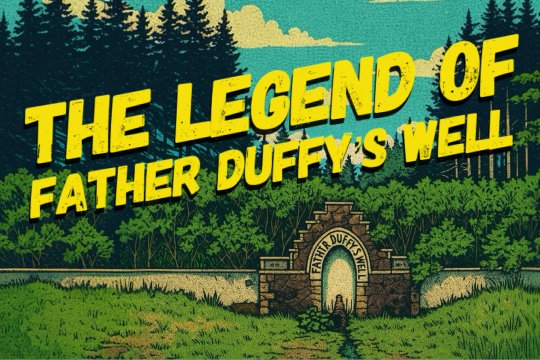
Nearly two centuries ago, before the quiet spring along Newfoundland’s Salmonier Line became known as Father Duffy’s Well, a conflict was brewing in the growing outport of St. Mary’s.
What began as a dispute over a fish flake soon escalated into a full-blown battle of wills between a powerful local merchant and a determined Irish priest. And amid the turmoil—on a long, weary journey between St. Mary’s and St. John’s—something happened that would spark a legend still told today.
Father James Duffy
It was 1834. Father James Duffy, a Catholic priest from Ireland, had recently arrived in Newfoundland. As a missionary, he was appointed the first parish priest of St. Mary’s—a mostly Catholic community on the Avalon Peninsula. His first order of business was building a proper church.
There had been chapels before, built on a low hill above the beach, but the site was exposed to fierce winds and the buildings never lasted long. This time, the new church would need a more sheltered location.
Father Duffy turned his attention to a stretch of beach at the base of the hill. The hill, he hoped, would offer protection. For as long as anyone could remember, that beachfront had been treated as common ground. Fishermen dried and mended their nets there, hauled up boats, and used the footpath to nearby Riverhead. It was a vital artery of daily life.
Everyone agreed it was the ideal site for the new church—everyone except John Martin, the local government representative and agent for the merchant firm Slade, Elson & Company.
Even before talk of a church began, the beachfront had caused tension. When a local fisherman built a flake on the spot, Martin claimed it belonged to the company and had the flake torn down. He then replaced it with a massive flake of his own—so large it blocked the traditional drying grounds, cut off the path to Riverhead, and even prevented townsfolk from reaching the cemetery.
Father Duffy, trying to act in good faith, approached Martin to ask permission to build the church. Martin refused—though he did offer an alternative: an unsuitable, boggy patch of land.
It was an insult, so Duffy pressed forward with his original plan.
With the help of his parishioners, much of the church was prefabricated in secret. Then in less than a day —without Martin’s knowledge— the building was erected on the beach.
Once the church was in place, Father Duffy returned to Martin —this time asking him, civilly, to remove the massive flake, calling it a public nuisance. Martin was furious. He accused Duffy and his parishioners of trespass and threatened to bring the matter to court.
He also retaliated by cutting off Father Duffy’s access to the merchant store.
In January 1835, while Martin was away in St. John’s, Duffy’s supporters took matters into their own hands and destroyed the flake.
Duffy was accused of inciting riot and rebellion, and a warrant was issued for his arrest. He was taken into custody and later released on bail, with a promise to appear in court later that year.
A Long Road to Justice
If justice was ever blind, it certainly wasn’t in 19th-century Newfoundland. Religion mattered —a great deal— and Protestants held most of the power. For a Catholic priest like Father Duffy, that made the road to justice especially steep.
After the destruction of the fish flake, charges were laid against Duffy and nine of his parishioners. That summer, the circuit court sat in St. Mary’s, but no action was taken. Instead, the matter was deferred to the Supreme Court in St. John’s.
Duffy was arrested while travelling through Fermeuse. Two constables escorted him to Ferryland, where he posted bail. He was told to appear during the winter court session, so he and another man made the long journey to St. John’s, arriving on December 30. But when they arrived, the Attorney General, James Simms, and the infamous Chief Justice Henry John Boulton —“the hanging judge”— were completely unprepared. The trial didn’t happen.
Back in St. Mary’s, things escalated. A government brig arrived to arrest the remaining eight accused men, but locals challenged the constables’ authority. Fearing violence, the constables withdrew. The island’s Governor was outraged. By May 1836, he had readied a warship and issued a proclamation demanding the men’s surrender.
An appeal from Bishop Fleming, of St. John’s reached St. Mary’s first. The men turned themselves in voluntarily and set out for St. John’s.
Still, the case dragged on. Witnesses failed to appear. Delays mounted.
Meanwhile, Father Duffy kept walking —again and again— from St. Mary’s to the courthouse in St. John’s, trudging through bogs, barrens, and dense forest. Some estimated he’d covered more than 1,500 miles in search of justice.
It was on one of those long, weary walks —thirsty and deep in the woods— that some say a miracle happened.
The Legendary Spring
Father Duffy and a small group had set out from St. Mary’s in the dark of early morning. By nightfall, they were deep in the woods, somewhere along what we now call the Salmonier Line.
Exhausted by the trial, the threats, and the endless miles, they stopped in a quiet clearing to rest. All they wanted was a warm cup of tea — but the forest was dry, and they couldn’t find a drop of water.
Just as they were about to give up, Father Duffy stepped away from the group. He walked to a large stone, broke a small branch from a nearby tree, and tapped the rock — once, then again. He knelt at its base and scratched a shallow hollow in the earth.
And then, something remarkable happened.
From the dry ground, a trickle of water emerged —slow at first, then steady— until it overflowed; cool, fresh, and clear. Enough to fill their kettle and lift their spirits.
To those who witnessed it, it was nothing short of a miracle: water from stone.
Of course, not everyone agrees. Some say Father Duffy didn’t summon the spring — he simply found it, hidden beneath moss and soil. Maybe he just knew where to look.
Either way, the result was the same: the kettle was filled, the journey continued, and the legend was born.
Father Duffy Acquitted
Refreshed by the spring water, the travellers made it to St. John’s. After months of delays, the case was finally dismissed in 1837 when no witnesses for the prosecution appeared.
Father Duffy returned to St. Mary’s with his name cleared. He remained there as parish priest until 1851, and later served in Prince Edward Island, where he became priest at Kelly’s Cross in 1859.
Father Duffy Dies
Father Duffy died in 1860, but even in death, his story didn’t end.
Though he served only briefly at Kelly’s Cross, he left a deep impression. He had requested to be buried along the footpath to the church — and so he was.
To many, he had been a living saint. After his burial, parishioners walking to Mass would murmur quiet prayers to him, and many believed their prayers were answered.
Then, in 1900 —forty years after his death— a new church was built. To keep their promise, parishioners exhumed Duffy’s remains to reinterred them at the new site. What they found shocked everyone.
The Charlottetown Examiner reported:
"Miraculous as it may seem, the remains, upon the grave being opened, were almost in a perfect state of preservation! What a joy re-awakened of the dead past in the breast of those, who, with loving hands tenderly laid away nearly forty years ago, the remains of their beloved 'old Father Duffy,' to gaze again on that face they knew so well..."
--
Charlottetown Examiner, Sept 20, 1900
According to the History of Kelly’s Cross Parish (1974), those present said he looked “just as fresh as the day he was buried.” One person even recalled, “they put new socks on his feet.”
To many it looked as if Father Duffy’s body was incorruptible. His body seemed immune to the normal processes of decomposition — a condition often associated with sainthood.
Devotion to Father Duffy surged once again. Some even wondered if the man they had once called a ‘living saint’ might deserve the formal recognition in death.
Father Duffy’s Well

Back in Newfoundland, the spring that bears his name has continued to flow—quiet and steady—for nearly 200 years.
Now known as Father Duffy’s Well, the site was transformed into a roadside grotto by the Knights of Columbus in the 1930s. To this day, you can watch the water drip into a shallow basin. For some, it carries special meaning. Whether or not they believe it rose by miracle, many feel the water was blessed by Father Duffy himself—and that it holds the power to heal.
Whatever you believe, Father Duffy’s Well remains a peaceful place to pause, reflect, and remember the steadfast priest who turned a weary journey into a lasting legend.

2 notes
·
View notes
Text
The Pacific Crest Trail: The US West Coast's 'greatest footpath'
By Gavin Scarff

One hundred years after the US designated the world's first wilderness area, an epic hike offers adventure seekers the chance to experience a slice of the nation's wild side.
On 3 June 1924, more than half a million acres of pristine mountain meadows, rock-walled canyons and aspen glades in south-west New Mexico's Gila National Forest were designated as the world's first protected wilderness area. One hundred years later, the National Wilderness Preservation System now counts 806 official "wilderness areas" spread across nearly 112 million acres in the United States – an area twice the size of the United Kingdom.
Two years after Gila's wilderness designation, educator and hiker Catherine Montgomery proposed creating "a high-winding trail down the heights of our Western mountains… from the Canadian Border to the Mexican [border]." The idea gained momentum during the 1930s under the stewardship of oilman and avid outdoorsman Clinton C Clarke, who dedicated much of his life to creating a border-to-border trail "traversing the best scenic areas and maintaining an absolute wilderness character", as he put it. This idea would eventually become the Pacific Crest Trail (PCT): a 2,650-mile path connecting Canada to Mexico and has been called the West Coast's "greatest footpath".
In 2023, craving a challenge that would break us from our desk-bound lives and thrust us into the wild, my partner, Claire Taylor, and I qualified as Mountain Leaders and set out on an epic journey to complete the entire PCT. For five months, we hiked past cascading waterfalls, snow-covered badlands and narrow slot canyons as we travelled south along "America's Wilderness Trail". Upon finishing, there was one section that really stuck out to us: the state of Washington, which is home to 31 designated wilderness areas (11 of which the PCT traverses).
The PCT section of Washington covers 505.7 miles of incomparable beauty over remote passes, snowy peaks and dense ancient forests with little sign of human life. And since Washington's portion of the PCT leads hikers through a greater percent of designated wilderness areas (63%) than the other two US states where the trail passes (Oregon and California, which contain 52% and 37%, respectively) it remains a true testimony to Clarke's vision of maintaining a slice of the original American wilderness.
Into the wild
"But what about the bears?" Claire asked. I replied with the line I'd been telling myself: "The presence of bears embodies the wilderness that we are seeking." In all honesty, having never hiked in bear and mountain lion country, we were a little nervous. We were about to spend five months hiking the PCT with nothing but our tent and hiking poles to protect us. But on our first day, we jumped out of the back of a pick-up truck whose faded bumper sticker read, "Into the forest I go, to lose my mind and find my soul", and onto the trail.
We had spent an hour cramped among a handful of other hikers bumping along a dusty dirt road that wound its way along steep cliff edges from the small village of Mazama, Washington, to the trailhead at Hart's Pass, stopping just once for a herd of large white mountain goats to cross. Since it isn't permitted to cross a remote, unmanned border into the US from Canada, most travellers hiking southbound actually start here at Hart's Pass. They then trek north for 30 miles to "tag" the border before returning along the same trail where the pick-up truck had dropped us off four days earlier.

The North Cascades
Our journey started in the North Cascades, a vast mountain chain spanning more than 500 miles known for its jagged peaks, subalpine meadows, glaciers and waterfalls. "If you look at a map of Washington state, all the wildest places run down the spine of the North Cascades mountains," says Chris Morgan, an ecologist, filmmaker and podcaster who has called the North Cascades home for the past 30 years. "That spine is where our wilderness areas protect the wildest of our wild – [our] untamed landscapes where nature rules and reconnecting with raw, unfiltered life is still possible." As Claire and I peered out from the dense forest up to the towering mountains that we would soon ascend and pass through, we were struck by the utter vastness, remoteness and grandeur before us.
Ancient "blowdowns"
Within designated wilderness areas, there is minimal human intervention. "[Protected wilderness areas] were set up as places for humans to visit, but not linger," Morgan explained. Ten days after setting off, Claire and I were hiking through Glacier Peak Wilderness Area, known for its heavily forested streams, steep-sided valleys and rugged glacier-covered peaks. Fallen trees littered the path, often requiring us to carefully clamber over or under the debris. We passed a large "blowdown" fir tree that had been knocked down by a storm, cut and cleared by hand. Upon closer inspection, we noticed that someone had counted and marked its rings. Squinting, we counted roughly 700, meaning this tree was here more than 100 years before Columbus sailed to the Americas. As Morgan told me: "These [wilderness] areas thrust you back in time… to a time that connects us all to the raw nature of primordial life."
Staying wild
The PCT is maintained by the Pacific Crest Trail Association (PCTA) and a team of incredible volunteers. When I later asked Kage Jenkins, who works for the PCTA, about the role of designated wilderness areas, I was taken back to the 700-year-old downed tree. Kage explained, "Trail maintenance projects in wilderness areas mean no chainsaws or motorised tools; we rely on the crosscut saw. There's a simplicity and joy in spending the better part of a day at the foot of a stratovolcano cutting an enormous Douglas fir."
I then asked how the PCTA manages to maintain the trail while also keeping it wild. "The trail itself always finds a way to stay wild," Kage said.

Shifting landscapes
By July, the snow had just melted but there was already talk of fire among fellow hikers. We passed one young trekker going north to the Canadian border, who told us, "I hiked 2,600 miles last year but couldn't reach the border due to fire closing the trail. I'm back to hike the last 50 miles!" Wildfires are a very real threat in Washington. In July 2014 the Carlton Complex Wildfires burned 256,108 acres. This threat also provides opportunities for nature; some animals like the black-backed woodpecker and fire chaser beetle have evolved specifically to thrive in burn zones, while seeds from plants such as the snowbrush have shown that fire can actually stimulate germination. A warming climate means that the frequency and magnitude of Washington's wildfires is likely to increase.
In late July, we came across our first real burn zone. We hiked in silence through the dead trees, it was eerily quiet and somewhat disarming. The charred remains were a sobering reminder of how seemingly indomitable landscapes can be altered so quickly.
Ups and downs
Claire and I quickly found hiking through Washington both exhilarating and calming. Shortly after setting out, we came across the first bear droppings we would see in the middle of the path. Some nights, our campsite was swarmed by mosquitoes that had recently hatched following the melting snow. Other times, as the skies darkened and thunder rumbled, we rushed to find a flat camping site to wait out the incoming storm. This rollercoaster pattern continued, with hours of sunny, stunning hiking interrupted by extreme weather and energy-sapping lows. As Kimberly Myhren, a hiker we befriended on the PCT, said, "What makes [the PCT in Washington] difficult to hike is also what gives Washington its serene and rugged beauty."
These ever-shifting landscapes only added to the sense of wonder and adventure we felt along the trail: we weren't just passing through the environment but interacting and coexisting with it. "As many wilderness areas are large enough that there is no cellular service, these landscapes are places where one tends to disconnect from technology and be present in a different manner," Michael DeCramer, policy and planning manager at the Washington Trails Association, later explained "Visiting a wilderness area can afford an experience of remoteness that is difficult to find elsewhere."
"The mountain"
After a few weeks, we settled into a rhythm. While our GPS told us that we were covering an average of 20 miles and ascending more than 3,200ft each day, we soon found that we were measuring things differently. We focused less on time and distance and more on how we felt emotionally and physically. We were, as DeCramer later said, "present in a different manner".

One sunny day in mid July, "the mountain", as it's known to those in Seattle, came into view. Mt Rainier, the iconic 14,410ft active volcano and the most glaciated peak in the lower 48 states, appeared like a beacon. We had hiked 250 miles and knew we would enter the Mt Rainier Wilderness Area at mile 330, and having a reference on the skyline reinforced how quickly we were moving; each time we emerged from a dark forest or from a sheltered hillside, the mountain seemed to grow. Where possible, we would pitch our tents to catch a glimpse of the mountain before we fell asleep. The following morning, we would watch the first rays of sun reflect off its snowy peak as we sipped our steaming coffee.
The climb
The high-altitude terrain means that hiking the Washington section of the PCT shouldn't be taken lightly. It took us a full month to reach the Oregon border; by then we had ascended nearly 100,000ft – the equivalent of climbing Everest three times. With bags full of food, water, a tent, a sleeping bag and mat, clothing, a stove and gas and other gear, your fitness levels quickly improve. We had spent months training, yet still found ourselves exhausted most days and falling asleep by 20:00. After just 19 days, we had both lost a fair amount of weight and managing our weight and calorie intake became a battle we would fight for most of the trail.
Wilderness and civilisation
Whenever we needed to hike into nearby towns for supplies, the transition from wilderness to civilisation was abrupt and it felt strange to suddenly interact with locals after having not washed in days. Being able to fill up on much-needed food was great, but it came with hiking out of town with a heavy bag. Our meals were made of lightweight, high-caloric foods such as seeds, nuts, dried fruit, noodles, porridge, milk powder and the occasional freeze-dried meal as a treat. We stored our provisions in bear canisters that doubled as stools as we sat preparing dinner each evening. The canisters are designed to prevent bears and other creatures from accessing to your food supplies, and ensure there is no association between people and food.
We were awoken one morning by the sound of a pack of coyotes playing as the sun came up, their howls echoing through the forest. We also had five bear encounters in Washington, including a close interaction with a mother and two cubs who were more interested in their pursuit of berries than our presence. We met hikers who had seen mountain lions just metres from their tent. Deer would appear from nowhere, often while we were camping, curious and unafraid. On many afternoons, we passed marmots who whistled loudly at us to stay away.
Rustic lodging
In many places, long hikes end at a cabin with a hot shower. This is not the case on this section of the PCT, however. "Washington is home to some of the most remote areas on the entire PCT," explained Kage. "There are 40-mile sections of trail between the nearest two roads, further still to the nearest town." We carried our home with us, diligently pitching it every night at one of the numerous flat dirt spots established by previous hikers along the trail. Many nights we slept closer than we would have liked to dead but still standing trees – "widow-makers", as they're known by hikers, for their tendency to fall in the night.
While there were times I certainly missed a hot shower, many hikers prefer this rustic approach. As DeCramer said, "Many people report that wilderness areas provide an opportunity to experience challenge and self-reliance." Kage agreed, adding, "The PCT helps ensure each hiker can enjoy their own wilderness experience: appreciating a natural landscape and ecosystem, finding isolation or connection to and interdependence of wild places."
"What about the bears?"
After a month of hiking through Washington, I thought back to Claire's first question as we set out: "But what about the bears?" As I began writing this, a PCTA update flashed up on my phone: grizzly bears will soon be reintroduced into Washington's wilderness areas. "There are only six ecosystems in the USA outside of Alaska considered wild enough for grizzly bears, and this is one of them," said Morgan, who has been instrumental in advocating for their reintroduction "They will feel right at home deep in the heart of the endless forests and giant peaks that their ancestors once roamed."
One hundred years since the Gila wilderness area came into being, this feels fitting. For PCT hikers and for Washington, it's one more reason to cherish this great wilderness.
9 notes
·
View notes
Text
random ac6 coffee shop au drabble hgh
MY BRAIN IS LIKE A NOODLE FROM WORK so here's a cute brainless coffee shop au drabble
The birds were singing, insects were chirping, and there wasn't a single cloud in the summer's sky, the day warm but not unpleasantly hot, and a beautiful vista stretching out from the public car park that Rusty had parked his jeep in.
Raven took the whole thing in with a distinct feeling of dread.
"The parking's free on Sunday," Rusty chattered happily, oblivious to his boyfriend mentally compiling his will. He pulled out a rucksack from the jeep's boot and easily slung it onto his shoulders, before holding out Raven's smaller and far lighter backpack. "So we can take all the time we need for our hike."
Raven nodded wearily and accepted his backpack. It contained two 2L water bottles, his lunch, as well as a few snacks, and a waterproof jacket, despite the good weather. Rusty had been very serious when he said that no matter where they hiked to, they should always prepare for bad weather. Raven just thought he was carrying extra weight for no reason.
But he had no one to blame but himself. When Rusty had excitedly asked him last week if he wanted to go on a 'nice, easy hike' with him on Sunday, Raven had unthinkingly agreed, always happy to spend time with his boyfriend. However, as the day approached, Raven gradually realised that he and Rusty had two very different definitions of a 'hike'.
Raven thought it'd be a short, pleasant walk in the countryside, two hours tops, and it'd be mostly flat. Rusty thought a 'nice, easy hike' was stomping up the mountain just outside of southern Xylem that was 'affectionately' called The Wall, due to its sheer verticality in some parts. Of course there was a path that could be walked by anyone with functioning legs, but the hike was expected to take almost TWO HOURS to get to the SUMMIT. FOUR HOURS IN TOTAL. TO WALK UP AND DOWN. A MOUNTAIN.
Raven, who was out of breath just climbing a single flight of stairs, quietly despaired.
Rusty, the evil tempress that had lured Raven to this uniquely cruel and unusual torture, beamed at him, clearly excited for the day. Raven didn't have the heart to admit to him that he was going to hate every moment of this. He can endure this, to protect that smile. He'll... he'll climb this mountain... for Rusty.
So, weakly, he smiled back.
"I've plotted our route," Rusty said, as they began to walk towards where the public footpath began from the car park. "I made sure to pick the easiest one, so you won't have to climb up any steep parts... if you get tired, let me know, alright? If it comes to it I can carry you no problem until you catch your breath."
Rusty held out his phone, which had a satnav app already marking out their route. Raven hid a grimace when he saw the '9.56 miles remaining!' at the top of the screen.
"You've got your inhaler, right?" Rusty asked, and Raven quickly nodded at that. He actually over-prepared and brought two. "Okay, good. I know you said you're fine with exercise but... really, let me know if you get tired."
Well, Raven was pretty sure exercise didn't trigger his respiratory problems, but he'd never actually... exercised to really test that out. Did a short one hundred metre jog count as exercise? It must do, right?
He kept that question to himself, though, gripping the straps of his backpack as they left the solid comfort of tarmac and onto the dusty, rocky dirt path that led towards the mountain. While things were still flat and manageable, Raven did take a moment to look about himself, admire the scenery, that sort of thing (it might be the last thing he'll ever see, after all).
Raven had never really left Xylem before today. He'd been to a few parks, and he had a very foggy memory from when he was a child where Michigan had dragged him and Walter to the beach that one time, but he hadn't really been dumped into the middle of nature like this before. It smelled different to the city, looked different, and sounded different.
It was nice.
Enough so that he briefly forgot he was meant to be dreading this whole hike, and happily kept pace with Rusty who was kindly moderating his strides to be short and slow just for him. Raven felt a burst of affection for him, abruptly, realising that he was very lucky to have such a considerate boyfriend like Rusty, even if he was insane and liked to climb mountains in his spare time... what a weirdo (fond)...
Things changed when they started hitting The Incline.
It was gradual, gentle enough that Raven didn't notice it at first, but then it sloped upwards sharply, and within minutes Raven was sweating, panting and valiantly trying to ignore the burn in his legs.
Rusty, of course, noticed. "Uh, buddy, are you okay?"
Raven made an off-hand sign for {fine}, stubbornly glaring down the path as he took another quad-burning step.
"I mean, it's just, you're looking a bit red there-"
Another step. Oh god. This was so hard. Rusty did this for fun?!
"-and I can hear you wheezing."
But Rusty had looked forward to this all week... no, no Raven will not surrender, he won't give in! He'll succeed! He'll finish this hike!! Bolstered by deranged motivation, Raven took two more wobbling steps.
"And you're sweating buckets..."
Argh, actually, this might be too much for him. They had to have done at least a mile, right? That meant he just had to do eight miles at most. If he can think of it like that, then he can do it, right? Right?!
Desperately clinging onto this hope, Raven signed a bit haphazardly: {How far? Distance????}
"Buddy..." Rusty slowed to a stop. "We've only done three hundred metres."
Raven staggered to a halt as well and stared, dismayed.
"I mean, you can still see the carpark..."
Rusty turned and pointed, and Raven followed where his finger was indicating, seeing that, yes, indeed, the carpark was right there, well in view. Rusty's jeep sparkled under the sun, a siren call of 'you can give up now and leave~~~~'
He was so, so tempted.
Rusty's expression was both amused and rueful when he looked back at him, rubbing the back of his neck. "Uh, if you want to call it there... we can. I mean, there's a lake not too far from there. We can walk around that instead. It's fine!"
So, so, so tempted....!!!!
{No,} Raven signed stubbornly, tilting his jaw and daring Rusty to argue with him. {I said I'd hike. I'm going to the summit. With or without you.}
"..." Rusty shook his head with a bit of a laugh. "Raven..."
{Witness me,} Raven proclaimed a bit deliriously, and resumed his arduous treck up the mountain path, huffing and puffing like a beaten up car engine on its last legs.
"Raven! C'mon..."
Raven kept going.
----------
...for about one hundred metres, before he gave up and lied down on the ground, staring up at the blue sky with Rusty staring down at him.
{Leave me for the birds,} Raven signed solemnly, and pointed at the vulture he could see circling above. He could hear how his breaths wheezed in his struggling lungs, his heart thundering to its very limits to keep him alive for these parting words (handsigns.... whatever). {I'll return... to the circle of life...}
"Okay, I think it's inhaler time," Rusty said with some amusement, and bent down to rudely roll Raven onto his side to get into his backpack. "Hm, you should really put it somewhere more accessible... ah! Got it!"
Rusty rolled him onto his back and handed him his inhaler. Sulkily, Raven took a puff (he felt himself inch away from death's door).
"So," Rusty said, as Raven came down from his delirious, oxygen-deprived high. "Lake?"
Raven rested his inhaler against his chest. {Lake.}
#armored core#armored core 6#v.iv rusty#c4 621#viv621#fanfic#coffee shop au#cute dumb fluff i had to get this out of my head ugh
15 notes
·
View notes
Text
A Pirate's Life for Me Ch. 13
Pairing: Stella/Scully
Rating: Explicit
Summary: Uh... surprise? The penultimate chapter of a fanfic I haven't touched since 2020. I started feeling itchy about leaving it unfinished so close to the end. Not to mentioned I re-watched Curse of the Black Pearl over New Years and felt like these characters deserved their dramatic ending.
So where did I leave off? Captured by privateer Jim Burns, Mulder and Scully re-think their plans to get home. Scully has a bit of an ah-hah moment.
Tagging @smol-scully who kept up with this weird world until the end.
Previous Chapters (linking all these is way more work than I remember): Part 1 , Part 2, Part 3, Part 4, Part 5, Part 6, Part 7, Part 8, Part 9, Part 10, Part 11, Part 12
Read it on AO3
~
“Give me your weapons. Both of you, or I’ll have to shoot the lady.” His voice aimed for fervent but fell short.
The hillside thumped beneath dozens of boots, and the flash of a scarlet uniform told Scully that Burns had arrived with reinforcements. A troop of redcoats formed a barricade behind him, muskets drawn. “I said, put down your weapons,” Burns repeated.
Scully shot a sidelong glance at Mulder before obeying. He gave the tiniest of shrugs. What else could they do? They’d made a mistake, letting their guard down while Stella was away, and they would deal with whatever consequences.
Burns cleared his throat. “On behalf of his Majesty the Sovereign King of England, you are hereby charged with treason and piracy. Let it be shown that Miss Dana Scully did willing aid Captain Stella Gibson, a known criminal, under penalty of death.” He pulled a roll of parchment from his satchel and held it out to Scully. She expected to see a smug glint in his eye, after he'd sabotaged Stella for refusing his help, but she saw none. If anything, he still looked hurt.
The parchment denoted a list of charges against one Captain Stella Gibson: treason, sexual perversion, piracy, aiding and abetting a jailbreak, destroying a ship of the Royal Navy. The final charge, she noticed, had been added recently. She wondered who had brought back word that Governor Spender was dead. Had some sorry, stranded soldier been spotted at the Hall of the Moerae and picked up by a passing ship?
The soldiers had already cuffed Mulder. She counted them in her head—twenty-three including Burns—and let them clap her in irons. She and Mulder couldn’t take these men on their own. Not even with Stella could they face down three against twenty-two, with nowhere to escape but a waist deep spring. Stella could die now, Scully lamented. She could eat and drink and die.
She held out her wrists. As Burns clapped the irons on her, she spat in his face. The men readied their bayonets, making to shoot her, but Burns lifted his hand. With the other, he wiped his stubbled cheek. “I do my job, Miss Scully. No more, no less.”
“You’re a coward,” she snapped, but one man tugged on her chains, and she stumbled forward into a trudging walk. Mulder walked in front of her, and she tried at intervals to peer around his broad back. They were moving swiftly uphill, following a narrow footpath that exited the spring but never properly led them out of tree cover. Scully’s thighs burned as they crested one hill and began to trace another, and she pressed her iron-clad hands against her legs.
Eventually, they exited the forest and began to marched up a cobble street. The surrounding buildings were uncharacteristically silent. This was Tortuga; of that Scully could be certain, but it was no part of Tortuga she’d seen on her last visit. Rather than the raucous pirate port and derelict docks, this section of Tortuga was mostly residences. They were poorly lit, some of them collapsing, and she couldn’t see a single bar or an inn. She turned her head for a better view and caught a glimpse of the see, far below them at the bottom of a steep hill. The golden lights of proper Tortuga glittered against the sea—smaller than she’d expected from this distance, but promising.
Wherever you are, Stella, Scully silently pleaded, don’t do anything rash. What could she expect from a woman who, up until a few days ago, had been more or less invincible? Unkillable Davy Jones, save for her heart in a box buried on a legendary island, was made mortal again, and she wasn’t sure Stella’s understanding of risk had caught up to her yet.
As Burns and his men led them through a maze of wet, silent streets, they crossed another unit of British soldiers. Their uniforms were crisp and their faces soft and youthful. Clearly, this was a new Navy outpost. Scully wondered if Spender had intended to take Tortuga—if so, his death had left a smattering of idle units in dangerous locations. That would certainly explain the empty buildings, and the morose air of this place.
“Oi! Tell the Commodore we’ve captured Wanted men at the port.”
“ At the port, Mister Burns?” one of the soldiers asked, in a tone that suggested Tortuga more or less terrified him.
“At the spring,” Burns clarified, and the kid let out a visible sigh of relief.
Scully held back a derisive snort—she had been that kid, once; Mulder had been too. Weeks at sea had culled any inclination she once held to hold back from a fight she had any chance at winning. She hoped Mulder understood that, so if she saw a chance at escape he’d trust her and take it. They had always done that for each other—chosen to trust. She hoped it would save their lives again tonight.
“The Commodore has already gone to bed. He said I shouldn’t wake him barring emergencies.”
“Tell him in the morning, then.”
“He’s leaving for Port Washington in the morning, Sir.”
Burns huffed the beleaguered sigh of a man who resented his station but knew he could do nothing to improve it. “He won’t leave until he confirms this job is done. I won’t leave until I’ve my reward.” He gritted his teeth, forcing an imperious snarl into those final words, and Scully recognized the intimidation tactic. She’d heard Stella do the same to Burns himself, and later to Spender. Burns had been her crew-mate, long ago. Had Stella learned the trick from him, or he from her?
“We’ll send for him in the morning,” one of the soldiers pipes up.
“Send him to the jail,” Burns said harshly, then gestured for his men to continue.
So they would be spending the night in a prison cell… she supposed there were worse things. She’d never been inside a jail, though she’d seen the brigs of a few ships. She’d even locked herself in a brig by mistake as a child, playing hide-and go-seek with the Quartermaster’s boys on her passage from England. A jail was just a brig that didn’t move, and she supposed once she’d been locked up for her crimes she’d have to call herself a real pirate.
Absently, she thought of her mother and the house on the hill. It wavered in her memory like a dream, that place. She remembered it sun-bathed and golden in the evenings, and the tired creak of the front door as her mother rushed to greet her after a day in the archive. Not for the first time, she worried what her mother would think if she trudged home one evening with an eye patch and a criminal history to her name. But Maggie Scully took most people in stride at her age. More so, Scully worried her mother would hear of her arrest and pull strings, or worse, put herself into legal trouble trying to get them out. Worst of all, what would Maggie do if her daughter never returned from sea? So many loved ones missing, claimed by Davy Jones’ Locker, transformed into sea mist. She couldn’t bear the thought of Maggie being the only Scully left, and even if she’d nothing else to live for (and Scully had plenty), that fear alone would’ve spurred her to survive and escape.
The prison was a small, low-roofed building that had clearly been converted from residences. Cells were located in the basement, with a Navy courthouse above them. The cells themselves could hold no more than two or three people, and a couple of the privateers cackled as they tossed Mulder and Scully into a single cell.
“Don’t have too much fun,” one of them sniggered, winking at Mulder. Mulder made a face and then a rude gesture, and Scully hid a smile beneath her hand. A wave of fondness for this impulsive man washed over her as Mulder sighed and sat back against the stone wall. She came over and sat beside him.
“Out of the frying pan and into the fire, I suppose. You think we’re getting out?” he asked, craning his neck to look at her in the corner of his vision. They used to talk like this often—seated side by side in the archive, glancing between paperwork and one another’s faces. Scully found that with a missing eye, she couldn’t perform the motions anymore, and she turned to face him fully.
Mulder looked utterly dejected, his lower lip sticking out and his face smeared with grime. He’d gained back a little of the weight he’d lost during captivity, but he was still too thin. His collarbones jutted out from the collar of his shirt.
“It’s not a lost cause. I suppose we’ll have to wait until morning to see the Commodore, and then maybe we’ll have a better sense of our predicament.”
“They won’t hang us.” It came out as a question.
“If they sentence us to death they’ll have to carry it out in Port Washington,” Scully said, a kernel of hope taking root.
“And if they don’t?”
Scully shrugged. “Maybe they’ll let us rot in here ‘til we either die or break out.”
“Stella could come for you,” Mulder said, his expression absolutely unreadable.
Scully replied, “she would. Not immediately, but she will. Mortal, she’ll have to go about it carefully.”
“And you’ll go be a pirate.” There was something wistful in Mulder’s voice—a grief she hadn’t noticed before. She recalled their earlier conversation, and his insistence that he’d go off searching for something else, whatever that was. She hadn’t given it a second thought beyond excitement for him; Mulder was always chasing some nebulous legend or another, and he’d never be satisfied with the answers he found. There’d been a momentary pause in the conversation, as they mourned an era of their lives largely spent together coming to an end. Now, though, Scully studied his expression, his stiff arms, his eyes that had always twinkled with unwavering faith. And she realized, for the first time, that Mulder loved her.
The force of this knowledge hit her like a cannonball to the chest. Mulder loved her, had quite possibly loved her for years, and he’d contented himself with long days and nights spent poring together over research. He’d chosen the intimacy of a shared quest over the possibility of losing her. He’d made a calculated choice, and Scully noticed with a stab of heartache that it hadn’t been the wrong one. Oh, Mulder.
Mulder had been taken, and Scully had absconded to his rescue and fallen in love with a pirate. And Mulder… he’d just dabbed whiskey over her eye socket and promised her it would be okay. She wanted to hold him and tell him the same tonight, that they’d be all right; they’d get out of here, and their lives would be right again. But the best possible ending for Scully wasn’t the same as for Mulder. In her best possible ending, she sailed with Stella into the horizon. She parted from Mulder, at least in some ways. She’d offered Mulder a place on that ship, but he was right—he could never take her up on it.
The truth was, Scully loved Mulder. She loved him fiercely enough to cross an ocean. She also knew she couldn’t love Mulder the way he wanted her to, and that alone necessitated their parting. It tore her up inside. She curled into a ball next to Mulder, their arms brushing in a reassurance the other’s body was still alive.
They passed the night like this, curling against the back wall and shivering occasionally. They slept with their backs together, but were woken at intervals by the scrabbling of rat feet on a dank floor. They hadn’t been given a chamber pot, and they took turns relieving themselves through the bars, in the empty adjacent cell. It was, she decided without question, worse than a brig. She missed the ship’s gentle rocking, and the sound of waves lapping on wood. At least the brig moved. The jail was stagnant. Without windows, she couldn’t tell the time, but she spent what felt like hours staring at the ceiling, pretending the specks of mold were stars.
The Dutchman will always come back for you, Stella had promised. Scully believed her. She was repeating this mantra in her head when the basement door opened, and Captain Burns walked into the room, flanked by two soldiers and followed by a familiar face.
“Commodore, we apprehended them at the port-side spring. You’ve seen the documents for their arrest, and you’ll see their faces match the descriptions given by the port authority.”
Commodore Skinner gazed at them expressionlessly. His bald head was covered by a wig, and he wore a fitting uniform that Scully had never seen on him before. His eyes darted between Mulder, Scully, and the parchment in his hands. He seemed to read it over a couple of times before turning to Burns and offering his hand.
“Excellent work, Captain. You’ve apprehended two dangerous pirates. I’ll take things from here.”
Scully pressed her lips together, avoiding Skinner’s eyes. Mulder, to his credit, said absolutely nothing.
Captain Burns shook Skinner’s hand, but his brow furrowed. “And the reward for their capture?”
“Of course.” Skinner handed him what appeared to be letter with the official stamp of the king. “Good for the stated amount in any English port. You’ll see it’s signed and dated. I unfortunately lack the authority and means in Tortuga to give you the gold myself, but you’ll find that a larger, more equipped settlement such as London or Port Washington will have no trouble ensuring your payment.
Burns squinted at the document for a few seconds, as if checking it for tricks or loopholes, then gave another one of those long-suffering sighs and tucked it away. “Thank you, Commodore. I understand you’re making for Port Washington this morning?”
“I am, Captain.” The title caused Burns to perk a bit. “Our vessel departs in an hour, though,” Skinner laughs and scratches his forehead, “they can’t right leave without me.”
“Well, I’ve good information the Flying Dutchman has made port in Tortuga. Its capture would be most beneficial to Her Majesty’s Navy.”
Skinner raised his eyebrows. “The Flying Dutchman? Why, Burns, you ought to know better as a seaman yourself. That’s nothing more than a children’s tale.”
Although Burns appeared sufficiently cowed, he risked a glare at Scully. She didn’t take the bait. “Only a rumor,” Burns assured him. “Although my source has been highly reliable in the past.”
“A reliable man can believe in all sorts of fantasies,” Skinner said mildly. “Now I’ve got to hurry here. And you ought to rejoin your men.”
Finally, finally, Burns trotted up the stairs. As soon as his footsteps had disappeared, Skinner approached the bars. Scully hurried to speak with him, and Mulder got to his feet behind her.
“Miss Scully, I’ll not deny I thought you were dead,” he whispered, clearly relieved. “Mulder, too.”
Mulder stared at him as if he were an apparition. “Sir, what are you doing in Tortuga?”
“I had a feeling Admiral Spender was up to something, and I sent a few men to investigate. Wouldn’t you know it, he sent me to check on the outpost here,” Skinner admitted. “No doubt keeping me on the fringes of his machinations.” He pulled a ring of keys out of his pocket and began to try them in the lock. “I hear he’s dead, and you two were involved. Care to enlighten me?”
“He’d enlisted Paul Spector to help him find Davy Jones’ heart,” said Mulder. They explain the rest in bits and pieces, leaving out the particularly gritty details as Skinner—still in his wig and uniform—broke them out of jail. Scully said little about Stella, and Mulder followed her lead, only mentioning that Davy Jones was real pirate, and the title had passed from man to man.
Skinner cuffed them loosely once they’d had a chance to collect themselves. They had to appear as prisoners, he explained, or else he wouldn’t be able to bring them safely to Port Washington. Once aboard, they could dress as passengers, assuming false names until they made berth. Their arrest records, unfortunately, could be neither destroyed nor expunged without a pardon from the crown. Skinner’s was not the only copy; a second had been drawn up and left in England, in case they crossed the Atlantic.
“While I’m grateful you’re both alive, I must urge you to be careful. And heed my words, as this may be the last time I address you both by name—Mister Mulder, you can likely plead your case at Port Washington now that word of Spender’s death has traveled. I suspect the survivors of the incident would not hesitate to sully his good name if they were promised a respectable sum for doing so. Miss Scully, I fear we may not meet again after this journey. To do so would amount to treason. Are we understood?”
They nodded and shook his hand.
* * *
Skinner led them toward the port accompanied by a guard of ten men. Ten were necessary, Skinner explained, to stave off the rowdy port crowd. Skinner’s ship was not marked as Navy for the same reason, instead docked as a simple merchant ship. No one would recognize or suspect it until the sailors began to board. They walked with bags over their heads, tied to ensure they couldn’t wriggle free. Theoretically this move prevent them from running off, but it also meant the sailors wouldn’t recognize their faces once they’d set sail.
Just outside Davy Jones’ Locker—the very pub where Scully had met Dani—they staged their escape. A crowd had begun to gather, and occasionally someone threw a rotten fruit or a stone at them as they walked. In the chaos, Scully broke free of formation and ran into a group of onlookers. Mulder broke in the other direction, and Skinner could be heard shouting after them! as they ran. Scully wound through people and stands, making a full circle around the pub before she darted inside, panting. She only had a few minutes before they’d rendezvous with Skinner at the ship. He’d delay his men on a wild goose chase; meanwhile Mulder and Scully would wash and change into more respectable clothes.
Still catching her breath, she scanned the pub for Stella. A few blonde heads milled about the morning crowd, but she recognized none of them. She turned toward the bar, hoping to find Dani, but instead the young man called Anderson was washing glasses with a rag. A newcomer filled pints beside him for sallow-looking men who had probably been there all night.
Scully caught Anderson’s eye and rushed over. “You seen Dani?” she demanded.
Anderson shot her a suspicious look. “The Captain came back,” he said brusquely, angling his eyes toward the newcomer. “She and Dani are going over charts. I thought you would know that, seeing as you’re traveling with her.”
Scully slapped two coins and a piece of parchment on the bar-top. “Give this to Dani, and tell her to give it to… the Captain.” Stella, she’d almost said, but apparently that wasn’t the right answer anymore.
“Normally, I wouldn’t ask the contents of a letter like that,” he started, “but you and I both know our Captain is in a more vulnerable position now. So what is your aim here, Miss Scully?”
“Bloody pirates,” she muttered. So damned suspicious. She wondered if Stella had come by, searching for her. She wondered if Stella had entertained the possibility that Scully and Mulder had run off together. They’d left three half-filled water barrels behind.
“Burns is here,” she explained in a low voice, hoping he’d understand. “He kidnapped me at the spring, and my only out is going back to Port Washington. This letter says that, and also some things you probably don’t want to read. She said she’d come for me, so if she meant that she’ll know where to find me.” She left out the Dutchman and Mulder’s name. Better not leave those details to chance and gossip.
For a moment, Anderson simply stared at the letter as if it might bite him. Then he tucked it into his pocket. “I’ll see she receives it,” he said simply.
Scully squared her shoulders and replied, “you damn well better,” before marching out the door.
She snaked through back alleys and winding, filthy streets toward Skinner’s ship. In the distance, she heard a soldier shout something, and veered an extra block in the opposite direction. Once in awhile, she had to stop and get her bearings in the narrow streets, feeling for a trusty ocean breeze. She still searched for a glimpse of Stella every time she passed by a group of people. As she approached the port, she allowed herself to slow just a bit, hoping against hope she’d spy Stella’s face in a sea of travelers.
When she arrived, Mulder and Skinner were already waiting for her. Both of them were red-faced and puffing, so her detour obviously hadn’t delayed them too long. Skinner led them to the Captain’s quarters, which were brighter and less feminine than Stella’s. He handed them bundles of civilian clothes and ordered them to change quickly.
When Scully stepped into that tub of water, she thought she might melt. She hadn’t bathed in fresh water since she left Port Washington, instead swimming in the Caribbean Sea and allowing salt to crust her skin. A splash of water here and there had protected her face and intimates, but water had been a precious resource, and drinking more important than bathing. She scrubbed her hair and scratched the dirt off her face. She removed her make-shift eye patch, slowly peeling the leather away where it had stuck to her skin. The initial searing pain of the wound had faded to a dull ache, and she risked touching the scab to feel how it’d healed over. Harsh, crusty skin beneath her fingertips made her cringe, but it was at least an improvement upon the last time she checked.
Stepping out of the bath, she was instantly struck by how tan she’d become. Her chest had grown freckled in the sun, and her arms had muscled from fighting lessons and, more recently, hauling sails. She put on her chemise, then her corsetry, then the overskirts. While her clothes had never suffocated, and indeed she’d worn them comfortably for years, she felt unexpectedly restricted by layers of ladies’ dress. It didn’t help that the chemise was a tad small and the overskirt a bit too wide, such that she had to tuck it slightly into other layers.
She combed her shorn hair, noticing for the first time its choppiness. She even took a pair of shears quickly to the ends to try and even it out. Too bad—if anyone asked, she’d tell them she burned it on a newfangled stove.
When she emerged, she tucked her arm into Mulder’s as if it were the most natural thing in the world. “Laura Petrie,” she’d call herself to the crew, and this was her husband, Robert. They were merchants seeking new prospects in Port Washington, but after a frightening run-in with smugglers and pirates had found themselves in Tortuga instead, with only the clothes on their backs and few coins to buy passage. Despite their rotten luck, they were determined to make a new life for themselves and were immensely grateful to the Navy for allowing them to travel as passengers aboard Her Majesty’s ship.
Mulder glanced down at her, eyes full of hope. “Ready to go home?” he asked.
Port Washington wasn’t the end of her journey. She knew that one day she’d see Stella’s sails crest the horizon, and she’d climb aboard the Dutchman as a living ship. But that didn’t forbid her from calling Port Washington “home.” The city had raised her; her mother, God willing, would live there for many years to come. And the house on the hill would stand watch, awaiting her safe return.
She smiled at Mulder and opened the cabin door. “As ready as I’ll ever be.”
#the x-files#txf fanfic#dana scully#stella gibson#stella x scully#pirate AU#a pirate's life for me#uh... pirate's life is back? I'm as confused as you are and I wrote it
6 notes
·
View notes
Text
Steep stuff: climbing the Hohentwiel

The altitude difference between Singen town centre and Hohentwiel fortress is only around 200 m... but a view of the mountain shows that it's going to be covered in a rather short distance.

To be clear, 18% is the steepest incline on the road, if you're driving a car, and even then, you'll only get to the Hohentwiel Domäne intermediate stop. The footpath starts climbing further around the mountain, and it's more of an 18% average!

The Domäne has a hotel-restaurant, at which I had lunch, providing shelter during a heavy shower! This made me hesitate to push further, and the previous post showed that there were more hovering around. I took a chance, the rain stayed away. Pick up a ticket to the castle and go through the little museum, and it's back to the climb, for pedestrians and cyclists only... still with over 20% in places!

3 notes
·
View notes
Text
Day 15 - Brno (Czechia)
I do manage to wake up earlier than yesterday! I decide to go check out the (formerly) industrial part of the city, starting with a walk alongside the Svitava river: there's a footpath/bike lane that goes along an old rail track that used to serve the factories (mostly textile mills) built on the riverside.
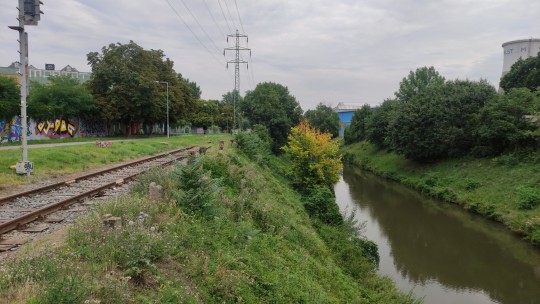
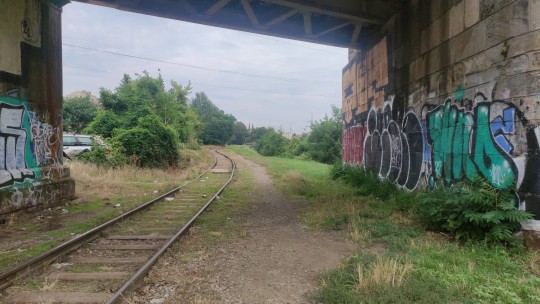
It's very pretty but even with no direct sun the weather is still pretty hot (and humid today), and even in the shade of the trees of a small park on the way it's not pleasant enough to just stop for a while and read.
So I decide to make the most of my 24h ticket that will expire in a couple of hours and go to Stránská Skála, a rock formation just out of the city (there's a tram that goes there. I LOVE taking trams to places outside cities). I wasn't sure what to expect, but I end up hiking to the top following a gentle enough path through trees and fields full of flowers.
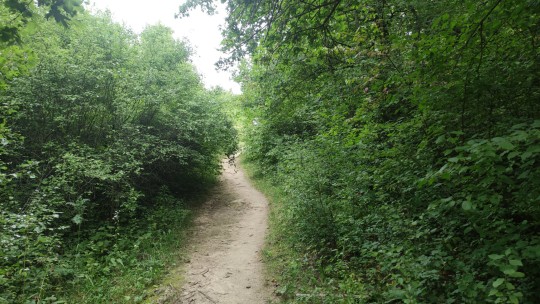
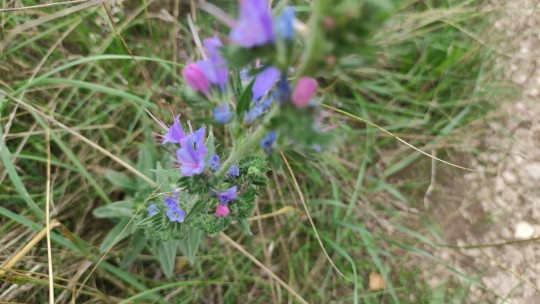
I'm sure the view would be better if it wasn't overcast, but on the other hand most of the path is out of the trees and it would have been very hard to walk in the scorching sun. For the entire time I'm there I only see a couple of people, but I guess if you live here you just don't chose a day like today to go on the rock.
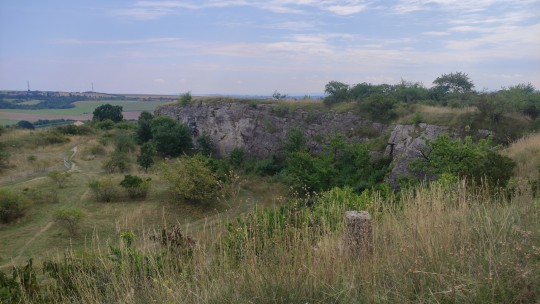
(I love places like these, gentle hikes that most people can enjoy. I live in a superflat valley right next to the Alps, the hikes that are usually available to me are INTENSE. But I don't want intense! I want gentle, calm and beautiful. That's why I particularly enjoyed walking the coast paths in the UK, I discovered a love of hiking there that I never thought I would have).
In the afternoon the sky clears up, the humidity lowers and the breeze comes back: it's nice enough that I decide to check out the bit of old town I haven't seen yet (there are still parts to be seen! This city is big!) and the park that surrounds Spilberk fortress.
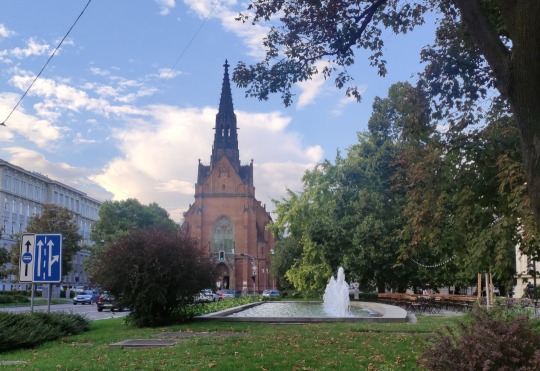
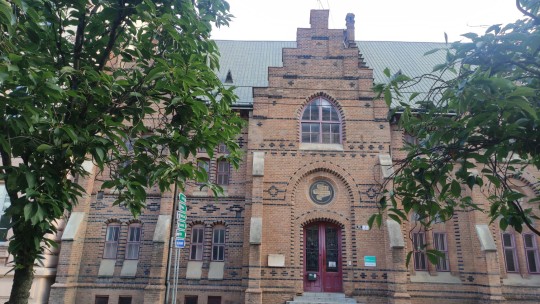
It's a beautiful park but it's literally all up hill, and most of the paths are quite steep. I sit on a bench reading for a bit, enjoying the atmosphere. Then I climb up a little more, and I'm rewarded with this beautiful view of the cathedral (I could very likely get better views from higher up but HAVE I MENTIONED HOW STEEP THE PATHS ARE?).
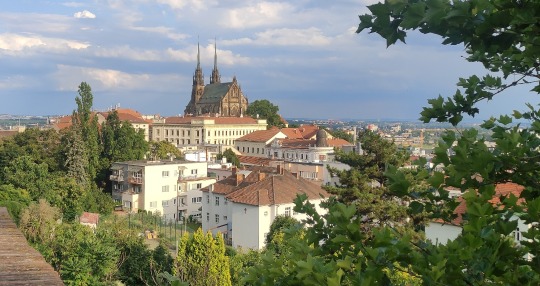
I pass through the old town hall and I'm reminded that I haven't shared with you the most beautiful dragon in the world!
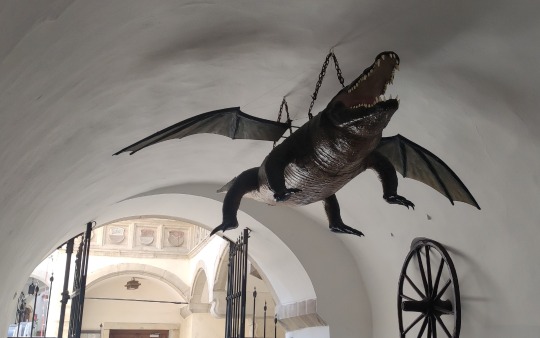
When I took this picture there was a Spanish family there with a tiny kid, and the kid was like "a crocodile! No... a dragon!"
I go back for the last time to the beer festival, and have halušky with sauerkraut and smoked bacon. And a radler. And yes, SUMMER OF THE RADLER. I still haven't find one as good as the watermelon one from Vienna, but radler beats both beer and lemonade right now. (I tried lemonade yesterday, it was good but definitely too sweet).
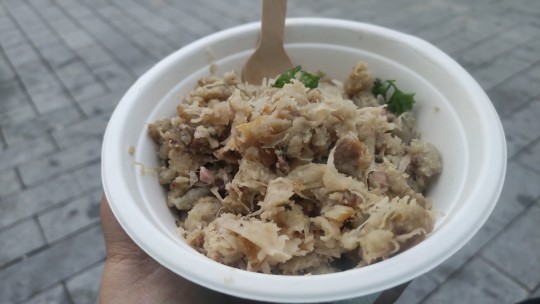
I keep thinking this is my last night in Czechia but it's not! I'll be in Plzen tomorrow night! Still sad to say goodbye to Brno, though, I think it might be my favourite city in this trip.
#brno#czechia#czech republic#europe#travel#it's not technically interrail 2023#mag travels from time to time#my photography#i just want a tag for the things i personally put out into the world
12 notes
·
View notes
Text
Day 17 - Cusco
We wake up at 7am as we are still on Rio time and get a delish breakfast cooked at our B&B. The accomodation is really nice - all centred around a courtyard with flowers everywhere.
We noticed that our hands and feet have pins and needles and wonder if it’s the altitude sickness kicking in but it turns out to be a side effect of Diamox - the medication we are taking to avoid the altitude sickness. I do have a bit of a headache today but nothing too much.
I make a quick pitstop to the ATM (the free one only allows 400 soles per card per day) and to buy Boleto Toristico - this costs S/130 each but allows us access to heaps of historical monuments in and around Cusco for the next 10 days.
After Jack is ready our first stop is Plaza de Armas. Cusco is such a cute city - the historic centre is full of historic buildings (albeit some in the main square had been turned into Maccas, KFC and Starbucks) and the flowers in the main square were meticulously maintained. People definitely seem to speak much better English here than elsewhere we have visited. Also everyone here seems to be so much friendlier than Argentina or Brazil! And as a bonus I feel so tall here - Peruvians are one of the shortest average heights in the world! We stop in one of the balcony cafes overlooking the Plaza de Armas for a coffee.
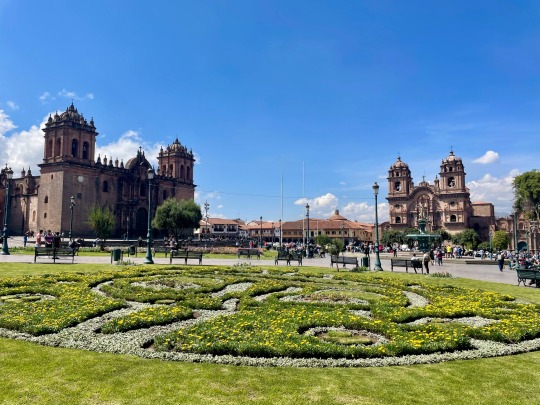
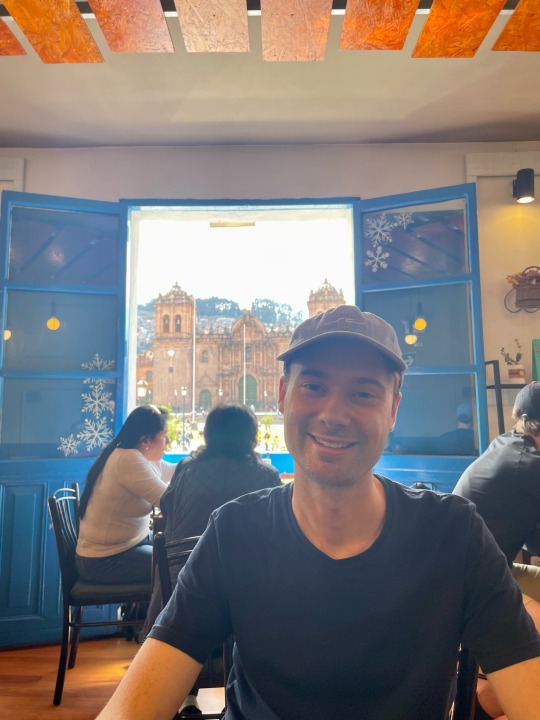
A few other observations we have made about Cusco - it must have the highest number of barbers per capita in the world!! Also the city is much bigger than we had expected. It’s not just a tourist town as was the case for Puerto Iguazú - people are living their everyday lives here too. The streets and footpaths here are sooo narrow (and the traffic and pollution is pretty bad).
We quickly realise that even though it was cold last night, in the sun today it’s baking so we head back to the room via the chemist to get sun screened up.
The second stop is San Pedro Central markets where we pick up some souvenirs and stop for an empeñada for lunch (plus custard flan - this seems to be a thing here - set custard in a glass).
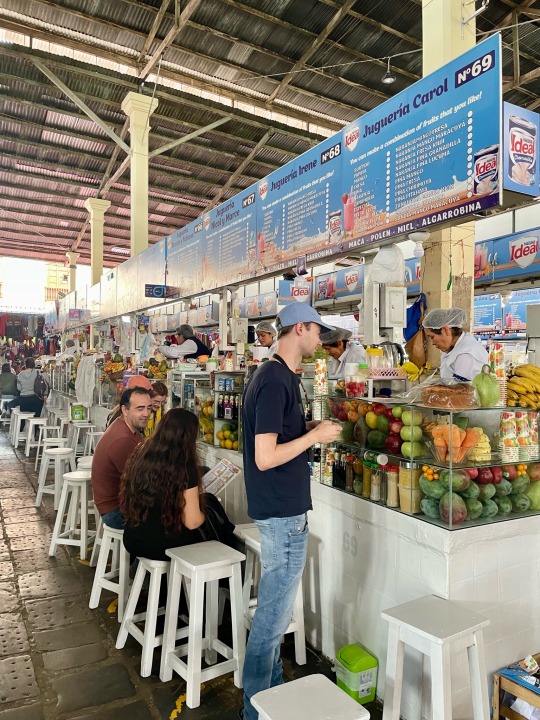
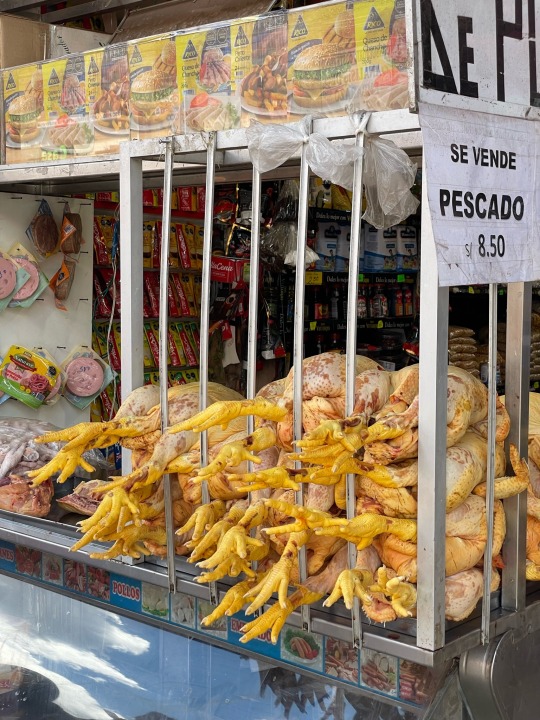
On the way out we realise that heaps of kids are leaving school and think that it seems early to finish up (1pm-ish). However, we also notice that they are all carrying gifts for their mums for Mother’s Day. It’s so cute!!
Our third stop of the day is Qorikancha (the most important temple in the Inca empire). It contained the Temple of the Sun. When the Spanish arrived they destroyed much of the site but as with much of the other Inca ruins they used the foundations and first story walls to build on top of and create Santo Domingo Church. Cusco (and Qorikancha) were the centre of the Inca empire. There were 4 states surrounding Cusco covering areas south into Chile and Argentina and north as far as Ecuador.
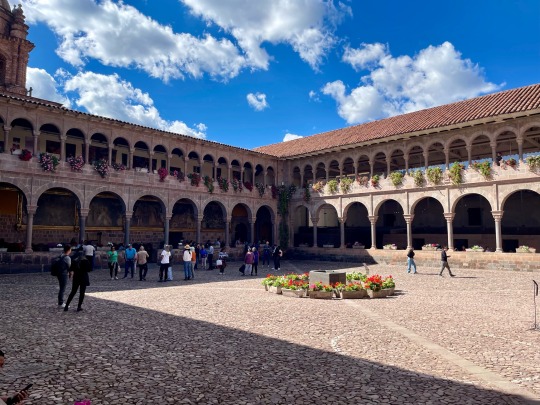
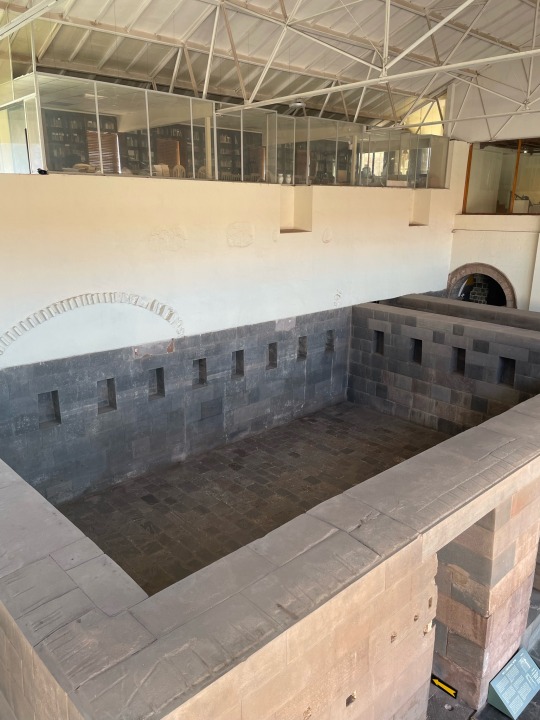
Our next stop is Saqsaywaman, it’s a huge citadel on the outskirts of Cusco. We were thinking of walking as it was only 25mins from Qorikancha but we ordered an Uber. Thank goodness we did as it was all up a very steep hill. Once we got there we still had to walk up many more steps to enter the site where the car could not access. This is where we really struggled - simply walking up some steps at this altitude feels like you’ve ran a marathon! Anyway after taking a break and drinking lots of water we made it to the top.
Saqsaywaman’s purpose is thought to be as a fortress, and of course as a temple and for religious ceremonies. The site is absolutely huge but there is little information so without a guide it isn’t easy to understand what we are seeing. The name Saqsaywaman means full eagle, this is thought to be because the last Incan resistance battle took place here against the Spanish and a large number of Incans would have been killed on the flat open grounds which would have attracted eagles. After their success the Spanish dismantled much of the site and used the stones for construction in the city.
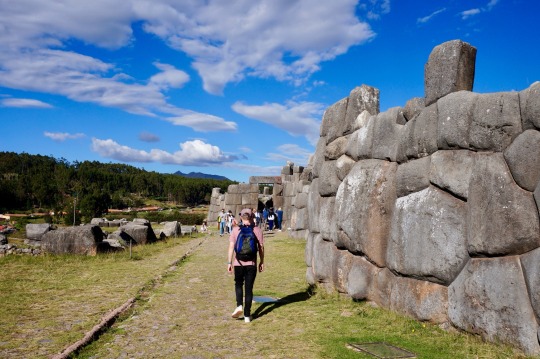
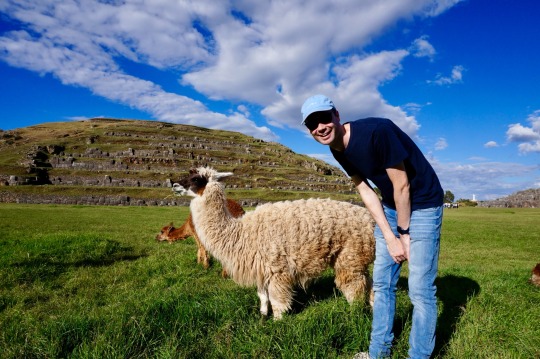
Time to pack up our bags again, we are off to the Sacred Valley tomorrow. For dinner we head out to a top rated restaurant in Cusco “Moray” - they seem to specialise in modern Peruvian cuisine. Jack has alpaca tenderloin whilst I order the Aji de Gallina (Creamy Chicken with rice and potatoes). Both are really good!! Back to the hotel it is.

2 notes
·
View notes
Text
Because I am still fighting for my life when it comes to this fic, and I have given up all hope that I will finish it on this side of the great beyond, have Part 2 of Chapter 1 of Nightingale at Casterbrook
Part 1 can be found here
Thomas had, in abstract, known that Mellenby was richer than he was. In terms of the Folly most were better situated than the Nightingales, though they’d never had reason to struggle financially, despite raising seven children. But Thomas hadn’t realised quite how rich the Mellenbys were, until Mellenby gave him a tour of the grounds upon his arrival.
“Alexander and Constantine belong to Hal and me, but we don’t have much use for them now that we’re off at Casterbrook,” Mellenby told him as he showed Thomas the stable and the three horses grazing nearby, “but I think father’s been riding them instead of Marc Anthony from time to time”
When Thomas had been ten his sister, four years older, had desperately wanted a horse. It had been a topic of discussion at the dinner table for several months, as Victoria had waged her first war against their father in a battle of wills that had frankly frightened Thomas. It wouldn't be the last, and certainly not the most devastating of their quarrels, but he still clearly remembered how much it would have cost them to keep even one horse, with how much the numbers had been shouted by their father. That the Mellenbys had enough money to keep two that they rarely had use for was startling. But considering the size of the sprawling grounds and house that Thomas had seen briefly in passing, four times as big as the one in which he had been raised at least, that shouldn’t have been surprising in the least.
“Did you bring new magazines?” Mellenby asked as they made their way towards the house at last. His luggage had been taken from him upon his arrival by a page and brought to the house that could only be reached by a steep footpath.
“Yes,” Thomas said, and added, “is your father home?” They would have to be careful if he was, since Thomas didn’t particularly fancy his magazines being taken from him or even destroyed.
“No, he’s in London for the rest of the month. It’s just Hal and us,” Mellenby said cheerfully. From what little Mellenby had told him about his father Thomas had gathered the impression that the two didn’t particularly get on at the best of times, and that the older Mellenby son was the only person capable of diffusing the situation.
Thomas had never officially met Henry Mellenby, but he had spotted him at Casterbrook in passing. The resemblance between the two brothers was strong enough for Thomas to have recognised him without actively looking out for him. Henry, two years older than them, was certainly more popular and better looking than his brother, with a lean face and easy smile, although the brothers shared their blond curls and bright blue eyes. Still Thomas was certain that of the two David was the smarter.
“Your father just left you two alone?” he asked, surprised. His parents certainly wouldn’t have, no matter how urgent the matter that compelled them away. Dick and Jos, the two oldest, were both up at Oxford, but if both of their parents had needed to leave Tavistock at the same time they would have convinced one of them, if not both, to come down and look after their younger siblings for the duration of their absence.
“I’m not sure father would really much care if something happened to either of us. Or to me at least”
Unable to think of a response Thomas watched Mellenby open the large doors that led inside his home for the next few days.
*
“So, you are Davey’s little friend then,” Henry Mellenby said when he finally emerged from his bedroom around midday. His tie was loose, the top button of his shirt undone, and it looked as if he had slept in it. He certainly appeared as if he had just gotten up, after a night spent drinking well into the early hours of the morning, “Nightingale, right?”
“Yes,” he said, unsure how to react. He had thought Mellenby’s brother would be more like him, bookish and proper. “I am”
“Don’t look at me like that,” he said, and laughed, “I’m not going to eat you. Where is Davey, anyway?”
“He wanted to get something from the library,” he’d left Thomas out on the patio, where they’d spent the last few hours, talking and reading some of the magazines Thomas had brought along.
“Of course he did, why do I even ask. Only my brother would abandon a guest in favour of the library.”
And abandon Thomas Mellenby did more often than not. It seemed that, just like at school, there was something pulling Mellenby to the library when there was nothing physically holding him back. So it was not a surprise that they ended up spending most of their time in there, apart from the few hours every day that Thomas managed to drag him outside.
“You never said that you were landed,” Thomas said one evening, as they shared some scones and tea in the library. At Casterbrook they would have been forced to do so in secret, at the risk of drawing the wrath of the librarian upon them, who had strictly forbidden food and liquids in his hallowed halls.
As if it was nothing out of the ordinary Mellenby shrugged. “My grandfather bought the land around the time my father was born. Our family had an arms factory and he made quite a lot of money with it, he even collaborated with the Folly to make rifles that could also be used as a staff. That’s how my father earned a spot at Casterbrook even though no one in the family had attended before”
Thomas, who’d never heard about any of this, leaned forward, intruiged. “Your father was a novus homo?”
Mellenby nodded, “Not that he likes to hear it mentioned. If he could he’d pretend that our family has been a part of the Folly since Newton’s time”
The Nightingale’s hadn’t been part of the Folly for that long either, but it was rare nowadays that someone was permitted into the closed shop that was the Society of the Wise. “Is that why you have all of these books on magic here?”
“In part. Father doesn’t like to rely on the Folly for his literature, so whenever he can he buys copies for our library” And his son took advantage of it whenever he could. It was no wonder then, that Mellenby was so obsessed with the workings of magic. While for Thomas and his family magic had become a part of life, with some uncle or brother in every generation being a wizard, it was still new for the Mellenbys, and much more exciting for any child born into the family.
Time at Mellenby’s passed quicker than he had thought imaginable, and before he knew it he was on a train back home, and in some ways his stay felt as if it had been a dream, and not reality. He returned to Tavistock, and with it to the madness his family exuded, in high spirits that even Andrew and his proclivity for arson could not put a damper on.
*
“Do you think he has a wife?” Ballentine asked during the first physics lesson of the new term.
They’d secured seats in the last row, at the cost of several sharp elbows to the ribs. It had been worth it, though, because Coombs - the physics master - never left his desk, which meant they could do as they pleased without him noticing a thing.
“He doesn’t wear a ring,” Thomas said quietly. In fact, as far as he had observed, none of their teachers were married. “Why?”
“Imagine having to wake up next to that face every day of your life. I think I would kill myself”
Coombs truly wasn’t a particularly pleasant sight, with a deep frown that never left his face, but his appearance was trumped by an even more unpleasant demeanour.
“But I bet Mellenby would love it,” Ballentine said as Mellenby, sat in the first row next to Cholmondeley, raised his hand in answer to a question Coombs hadn’t even gotten around to asking yet.
“I think Mellenby is blinded by his love for the subject. There could be anyone else standing there and he probably wouldn’t even notice the difference,” Thomas said, although he felt bad talking about Mellenby behind his back. Somehow - Thomas still wasn’t sure when it had happened - they had become friends.
“How can anyone enjoy this?” Ballentine grumbled as Coombs wrote some indecipherable equation on the board, “this is torture”
Thomas shrugged. He couldn’t understand it either, after all.
After class they pushed through the stream of students trying to get outside, and wandered off to the small group of trees that had become their usual spot. Ballentine dropped his bag on the grass and flopped down beside it, Thomas following suit just moments later, bedding his head on his book bag. He closed his eyes, and did his best to soak up the remaining sun before it disappeared for the winter. It was still unusually warm, and all of them - except for Mellenby, perpetual resident of the library - were spending as much time outside as possible.
“Did you do the Latin translation for tomorrow?” asked Horace Greenway, who hadn’t been with them just a few moments before.
Thomas cracked open an eye to make sure Greenway was talking to him and not somebody else who had joined them without Thomas noticing and was one of the three students in their class who actually did the translation - highly improbable but one had to hold on to hope in order to remain sane at times.
“Yes,” he said, “it was rather involved and complicated”
He enjoyed Latin and Ancient Greek, but there were some texts that were simply unpleasant to translate. German and French were more enjoyable in that way, and having students in their class who already spoke the language fluently certainly was a great help - even if Mellenby spoke German in a dialect no one could understand and most of the French Champers knew couldn’t be repeated in polite company. Still he preferred Latin and Greek. There was something about the distance in time, the mysticism, that made them rather enticing to him.
“Not Seneca again, surely,” Greenway said.
“Afraid so”
Greenway and Ballentine groaned in unison.
“You can copy my translation,” Thomas, who’d known what Greenway wanted from the beginning, said, “but change the wording a bit, otherwise it’ll be obvious half the class didn’t do it and copied mine instead”
Mellenby had copied it as soon as Thomas had been finished, in exchange for his physics and chemistry work, and Cholmondeley had undoubtedly asked Mellenby. Pascal and Champers had both asked for it earlier than morning, and Sanders was likely going to do so as well, shortly before Lights. That the Latin master - Timmins - hadn’t noticed yet was a miracle.
He had to sit up to pull the translation out of his bag, which was rather a shame considering how the sun had felt on his face, and he leaned back as soon he had handed the pages over to Greenway.
“You’re a saint, Nightingale”
“I know”
“If Timmins notices something we can just say we did it together,” Ballentine said as he moved closer to Greenway, so he could get a better look”
“Ten people doing a translation together is very believable. You could, of course, try to do it on your own,” Thomas suggested, “then you wouldn’t have to lie about it”
“With weather like this? It should be a crime to make us do this the first week back”
Thomas moved his head so he could watch the other students spread out across the lawn while his friends wrote as quickly as they could. Most of the boys were gathered in small groups of three or four, but there were a few larger groups as well. What looked like the Upper Sixth Formers had started an impromptu rugby game, and a few of the younger students had gathered around them to watch.
“Sanders said the Lower Sixth has smuggled in beer for the campfires tomorrow,” Ballentine said, “and apparently we are getting some as well”
“Really?” Thomas asked, interest piqued. He’d tried alcohol for the first time that summer, sneaked out of the kitchen by Pip, while everyone else had been distracted by their grandfather’s birthday celebration. They’d shared it late that night, Pip, Thomas and Stephen, in the bedroom that Thomas had been sharing with Spud since he had been old enough to move out of the nursery, and sometimes with Pip as well, whenever he was forced to surrender his bedroom to Aunt Anthea’s brood when they came to visit.
It had been wine then, not beer, but at the thought of the buzz that had settled over him after the first few sips Thomas didn’t much care what he had to drink to feel it again.
“Don’t tell the swots, though,” Ballentine said, “I wouldn’t put it past them to go to Marriott with it”
Thomas had helped him down, once he had found out about it, but to this day he wasn’t sure how long Cholmondeley had been in that tree. The Masters had been livid, of course, but Cholmondeley had refused to say anything about what had happened, so they couldn’t prove that it had been Ballentine.
Greenway shook his head. “I don’t think so. Mellenby sneaks out of the dorms almost every night, which I am sure he doesn’t want to get to Marriott, and Cholmondeley won’t do something like that on his own. He knows what is going to happen if he does”
Everyone knew what was going to happen, they’d seen it before. Early into their second year Cholmoneley had corrected something Ballentine had said in class and, not five hours later, had found himself in one of the trees farthest away from the buildings, dangling upside down from one of the lower branches.
Everyone knew, though. And everyone had understood that they shouldn’t get into his way, unless they were confident that they could hold their own against him.
“If we asked them they might even join us this time,” Thomas suggested, “no point in ratting us out if they’re benefitting from the contraband as well”
“Invite Mellenby and Cholmondeley to our bonfire? The only thing they talk about is science - and in a frightfully boring way at that”
“They’re not that bad, once you get to know them”
“You have been spending an awful lot of time with Mellenby,” said Greenway, “but I had thought that was under duress”
“It was at first, but he’s gotten easier so get along with, over time. He even let’s me copy his homework at times”
“And why is this the first we hear about that? Last term Dudders made me do his filing because I hadn’t done my exercises”
“Mellenby doesn’t want me to pass on his work. Apparently we are never going to learn if we just copy from him”
“I can live a happy and fulfilled life without understanding physics or chemistry,” said Greenway, “in fact my life would vastly improve if I never had to bother with it again”
“I’ve told him the same,” said Thomas, “he doesn’t believe me. And I am sure he will try to argue with you about it”
*
Beer, Thomas decided, was his new favourite thing in the world. He’d managed to secure a second bottle before the lower sixth formers had run out of their stock to pass around, and he cradled it to his chest as if it was made out of solid gold.
Although it was autumn the night was still warm, and most of the students were out in the woods, for what would be the last campfires of the year. Thomas had settled on a log close to the fire and watched Mellenby and Cholmondeley, both bent over a book listing the most common spirits in England, discussing which one they should try to summon later.
“Are we in the lead up to Ballentine and Mellenby bashing each others heads in where the Masters won’t see?” Danny Shanks asked, sitting next to Thomas, alas sans beer, “or what is happening here, exactly”
“Mellenby is going to try and summon a spirit - not sure which one”
“You put him up to that, didn’t you?”
“I don’t know what you are talking about”
Shanks raised an eyebrow. “Why would Mellenby choose to do that here, in front of all of us”
“He does like to show off, in case you hadn’t noticed”
“But he hasn’t actually summoned a demon before, has he? The way I see it he is setting himself up for failure”
“Ballentine might have, ahem, suggested the same last night at dinner,” Thomas said and took a sip of his beer, “in front of everyone” Shanks hadn’t been there, instead serving detention once again.
Shanks scoffed. “Do you think he can do it?”
Thomas shrugged. “I think if he doesn’t succeed now he’ll spent every waking hour trying until he does. So I hope he’ll manage it, for the sake of our sanity”
#rivers of london#this fic has gotten slightly out of hand and it just gets longer and longer#there is only one more part for ch 1#but I am going to finish all three chapters before posting the whole thing on ao3
8 notes
·
View notes